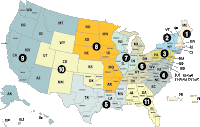This is not a new story, however, just came to my attention from an article published by the BC Heights today. The story indicates that "Last March 30, the Boston College Police Department (BCPD) entered Riccardo Calixte's, BC '09, dorm room and seized an iPod Touch, a disassembled Blackberry cell phone, a Dell Inspiron, a MacBook laptop, and other computer-related devices." The Massachusetts Supreme Judicial Court has since quashed the search [see here].
The Citizen Media Law Project described the facts as follows:
In January of 2009, soon after Riccardo Calixte and his (now ex) roommate suffered “domestic issues,” the roommate made certain allegations to Boston College Detective Kevin Christopher, including that Calixte had “hack[ed] into the B.C. grading system . . . to change grades for students” and had “a cache of approximately 200+ illegally downloaded movies as well as music from the internet.” On March 30, Detective Christopher applied for, and was granted, a search warrant to seize Calixte’s computers, electronic devices, and digital storage devices. In his application for the warrant, Christopher also alleged that Calixte was the author of a mass email to the Boston College community that “outed” his ex-roommate as gay and included a link to a profile on a gay online-dating site created in his ex-roommate’s name.
You can also visit the Citizen Media Law Project database entry here, which provides an extensive summary of the case.
After the seizure, Calixte teamed with the Electronic Frontier Foundation and Fish & Richardson - who took the case pro bono. After the trial court denied a motion to quash the search warrant, Justice Margot Botsford of the Massachusetts Supreme Judicial Court reversed the decision and quashed the warrant. The decision from Massachusett's High Court can be found here.
Fish & Richardson summarized the decision here and stated:
The Court found that the search and seizure was unlawful because the affidavit failed to establish probable cause that a crime had been committed, or that evidence of a crime existed in Mr. Calixte's computer equipment. The affidavit failed to establish that any grades had been hacked by anyone, much less by Mr. Calixte. Although the affidavit contained an unsubstantiated report from an alleged eyewitness (the former suite mate), the affidavit failed to explain when the alleged incident occurred, where it occurred, and how (and with what equipment) it was accomplished. These are all facts that any actual eyewitness would have been able to supply. Moreover, the affidavit also lacked evidence that the police ever tried to confirm with the College's computer administrators and professors that such a breach had occurred before searching Mr. Calixte's room.
The Court also rejected the Commonwealth's theory that spreading rumors by email could constitute the crime of unauthorized access to a computer system. To the contrary, the Court noted that such a reading of the statute would "dramatically expand [the law's] appropriate scope."
"This case establishes two important legal principles at the intersection of criminal law and computer technology," said Larry Kolodney, a principal in Fish & Richardson's Boston office and chair of the firm's pro bono committee who served as lead counsel in the case. "First, it clearly rejects the concept, which has found some support in other jurisdictions, that violating the fine print of a computer use policy is a crime. This is an important decision that should serve as a bulwark against similar efforts at prosecutorial overreaching in the online world. In addition, the case provides important safeguards against arbitrary searches of computers and other digital devices - devices that often contain our most private information - based merely on the flimsy accusations of someone with an axe to grind."



0 comments:
Post a Comment